Wipes in pipes
Why not flush wipes?
Wastewater systems are only designed for human waste and toilet paper. Toilet paper is the only material that can break down quickly enough for our wastewater system. Most wet wipes contain plastic, which doesn't break down.
Blockages in our wastewater system are expensive and disruptive. Every time you flush the toilet, pull the plug from a sink, or have a shower the wastewater drains into your private plumbing and out to our network.
Blockages cause our wastewater system to overflow and this impacts us all when:
- ratepayers pay thousands of dollars in pipe repairs every year
- avoidable overflows into our natural environment close beaches and waterways, disrupt our marine industries and prevent people collecting kai moana
- residents and visitors are inconvenienced when public toilets are closed for repairs
- blocked or obstructed pipes reduce flows and can cause pooling of wastewater that may impact your health and the structural integrity of your home.
Check out what a typical blockage can look like.




The wastewater that enters our network consists predominantly of:
- water
- human waste
- food scraps
- fats
- debris
- chemicals and pharmaceuticals.
This can build up in pipes, causing blockages and overflows. Whatever we're pouring or flushing down the drain can end up in public pipes.
But aren’t wipes biodegradable?
Wet wipes contain plastic and other synthetic materials, so they don’t disintegrate like toilet paper - even if it says they are 'biodegradable' on the packet. Wet wipes get stuck in pipes, then bind with fat to create ‘fatbergs’. These become rock hard and cause blockages.
When there’s a blockage on your property in your private pipes, you (or your landlord) must pay for a plumber to fix the problem. When blockages affect public toilets or other parts of our wastewater infrastructure, all ratepayers must pay the bill.
The solution
The 'three p' guideline: flush only PEE, POO, PAPER.
It’s that simple. If in doubt about what to flush remember the ‘three P’ list.
This video demonstrates how wipes are a problem around the world.
Below are some posters you can download and print off to go in your toilets at work or home.

